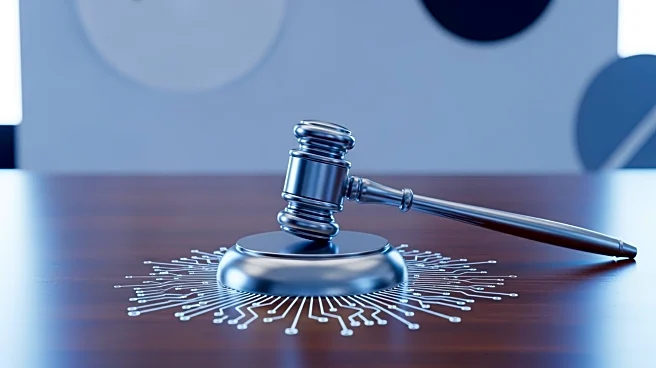What's Happening?
President Donald Trump is considering an executive order to pressure states to halt regulations on artificial intelligence (AI). The draft order, obtained by The Associated Press, suggests that federal agencies identify and challenge state AI regulations deemed
burdensome. The proposal aims to develop a national regulatory framework that would override state laws. Trump argues that the current patchwork of state regulations impedes AI innovation and allows China to gain a competitive edge. The draft order, which could change, is expected to be signed soon. Meanwhile, House Republican leaders are discussing a proposal to temporarily block state AI regulations. Critics, including civil liberties groups, warn that such measures favor large AI companies and reduce oversight.
Why It's Important?
The proposed executive order could significantly impact the AI industry in the U.S. by creating a unified regulatory environment. This move is seen as a way to boost innovation and maintain global competitiveness, particularly against China. However, it raises concerns about the lack of oversight and potential discrimination in AI applications. State regulations currently address issues like data privacy and transparency, which are crucial for consumer protection. The debate highlights the tension between fostering technological growth and ensuring ethical standards. If enacted, the order could reshape the regulatory landscape, affecting both large and small AI companies.
What's Next?
If President Trump signs the executive order, federal agencies will begin identifying state regulations to challenge. This could lead to legal battles between the federal government and states that have enacted AI laws. The development of a national regulatory framework will be crucial in determining the future of AI governance in the U.S. Additionally, the House Republican proposal to block state regulations may gain traction, further influencing the regulatory approach. Stakeholders, including tech companies and civil rights groups, will likely engage in lobbying efforts to shape the outcome.
Beyond the Headlines
The push to limit state AI regulations raises ethical and legal questions about the balance between innovation and accountability. Critics argue that reducing oversight could lead to discriminatory AI practices and undermine public trust. The debate also touches on broader issues of federal versus state authority in regulating emerging technologies. As AI becomes increasingly integrated into daily life, the need for transparent and fair regulations becomes more pressing. The outcome of this proposal could set a precedent for how the U.S. handles technological advancements and their societal implications.

















